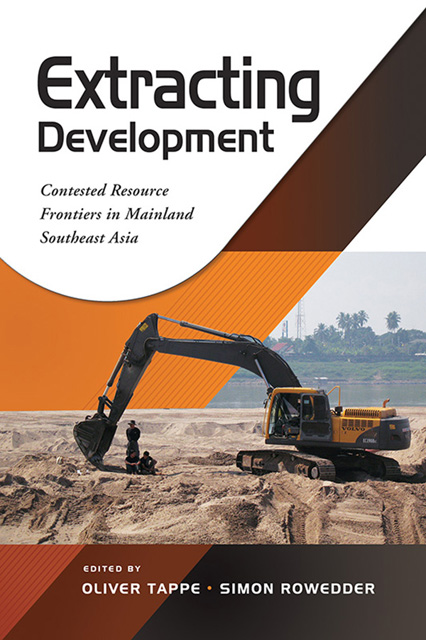Book contents
- Frontmatter
- Contents
- Acknowledgements
- The Contributors
- 1 Contested Resource Frontiers in Mainland Southeast Asia: An Introduction
- 2 Ontological Politics of the Resource Frontier: A Hydrosocial Analysis of the Mekong River in Northern Thailand
- 3 Reassembling Frontiers for Middle-Income Peasants: Rubber Expansion and Livelihood Ecosystem Transformation in a Northeast Thai Village
- 4 “Only the Best Fruits for China!”: Local Productions of a ‘Fruit Frontier’ in the Borderlands of China, Laos and Thailand
- 5 Commodity Frontiers in Motion: Tracing the Maize Boom across the Lao-Vietnamese Borderlands
- 6 New Frontier Spaces: Complex Entanglements and Power Relations (Re)shaping Land Governance in Laos
- 7 Moving Away from the Margins? How a Chinese Hydropower Project Made a Lao Community Modern and Comfortable
- 8 Frontier Capitalism in Colonial and Contemporary Laos: The Case of Tin Mining
- 9 Chinese Investments and Resource Frontiers in Cambodia: Systemic Transformation
- 10 The Open Issues: Cases between Chinese Investment Companies and Local People in Myanmar
- 11 Internationalization of RMB and Tin Ore Trade in China-Myanmar Frontier Governance: Views from Yunnan Province
- Index
2 - Ontological Politics of the Resource Frontier: A Hydrosocial Analysis of the Mekong River in Northern Thailand
Published online by Cambridge University Press: 30 June 2023
- Frontmatter
- Contents
- Acknowledgements
- The Contributors
- 1 Contested Resource Frontiers in Mainland Southeast Asia: An Introduction
- 2 Ontological Politics of the Resource Frontier: A Hydrosocial Analysis of the Mekong River in Northern Thailand
- 3 Reassembling Frontiers for Middle-Income Peasants: Rubber Expansion and Livelihood Ecosystem Transformation in a Northeast Thai Village
- 4 “Only the Best Fruits for China!”: Local Productions of a ‘Fruit Frontier’ in the Borderlands of China, Laos and Thailand
- 5 Commodity Frontiers in Motion: Tracing the Maize Boom across the Lao-Vietnamese Borderlands
- 6 New Frontier Spaces: Complex Entanglements and Power Relations (Re)shaping Land Governance in Laos
- 7 Moving Away from the Margins? How a Chinese Hydropower Project Made a Lao Community Modern and Comfortable
- 8 Frontier Capitalism in Colonial and Contemporary Laos: The Case of Tin Mining
- 9 Chinese Investments and Resource Frontiers in Cambodia: Systemic Transformation
- 10 The Open Issues: Cases between Chinese Investment Companies and Local People in Myanmar
- 11 Internationalization of RMB and Tin Ore Trade in China-Myanmar Frontier Governance: Views from Yunnan Province
- Index
Summary
INTRODUCTION
In Chiang Khong District, northern Thailand, the current governance and plans of the Mekong River are contested, as are the future imaginaries for the river. Here, over the past two decades, the hydrological and ecological characteristics of the Mekong River have changed due to the construction and operation of hydropower projects upstream in China, with consequences for the lives of those who depended on river resources (Santasombat 2011; Räsänen et al. 2017). The changing river conditions have also held consequences for local social and cultural practices and beliefs connected to the river (Johnson 2019; Yong 2020). In 2019 and 2020, a serious regional drought and low and unpredictable river flows left sand bars and rocky outcrops exposed along many stretches of the river and placed at risk ecosystems, fishing and farming livelihoods, and wider food security, creating severe hardship (Middleton et al. 2021). These conditions intersected with the operation of China's large hydropower dams upstream, as well as a period of intensifying geopolitics between the US and China, further escalating the already present resource politics in northern Thailand and across the wider region (Keovilignavong, Nguyen, and Hirsch 2021). In this liminal context, the Mekong River as a resource frontier remains unsettled.
In this chapter, in the context of the severe low flows, we examine the resource politics of the Mekong River in northern Thailand as revealed through the practices, narratives and knowledge productions of several competing networks that shape the Mekong River as a resource frontier. These include the community and civil society movementled Ing People's Council (IPC), the intergovernmental Mekong River Commission (MRC) and the Lancang-Mekong Cooperation (LMC). Our conceptual approach reflects the growing recognition of the heterogeneity of water cultures and histories (or “water worlds”) in recent academic literature (Barnes and Alatout 2012), and the multiple ontologies of water that underpin them (Vogt and Walsh 2021). We draw in particular on hydrosocial literature that emphasizes how rivers are entwined within social processes that produce multiple forms of water-society assemblage (Wesselink, Kooy, and Warner 2017). Linton and Budds (2014, p. 175), for example, observe that “different kinds of waters are realized in different hydrosocial assemblages; in one such assemblage, water is constituted as a public good, while in another, it is constituted as a commodity”.
- Type
- Chapter
- Information
- Extracting DevelopmentContested Resource Frontiers in Mainland Southeast Asia, pp. 28 - 48Publisher: ISEAS–Yusof Ishak InstitutePrint publication year: 2022



